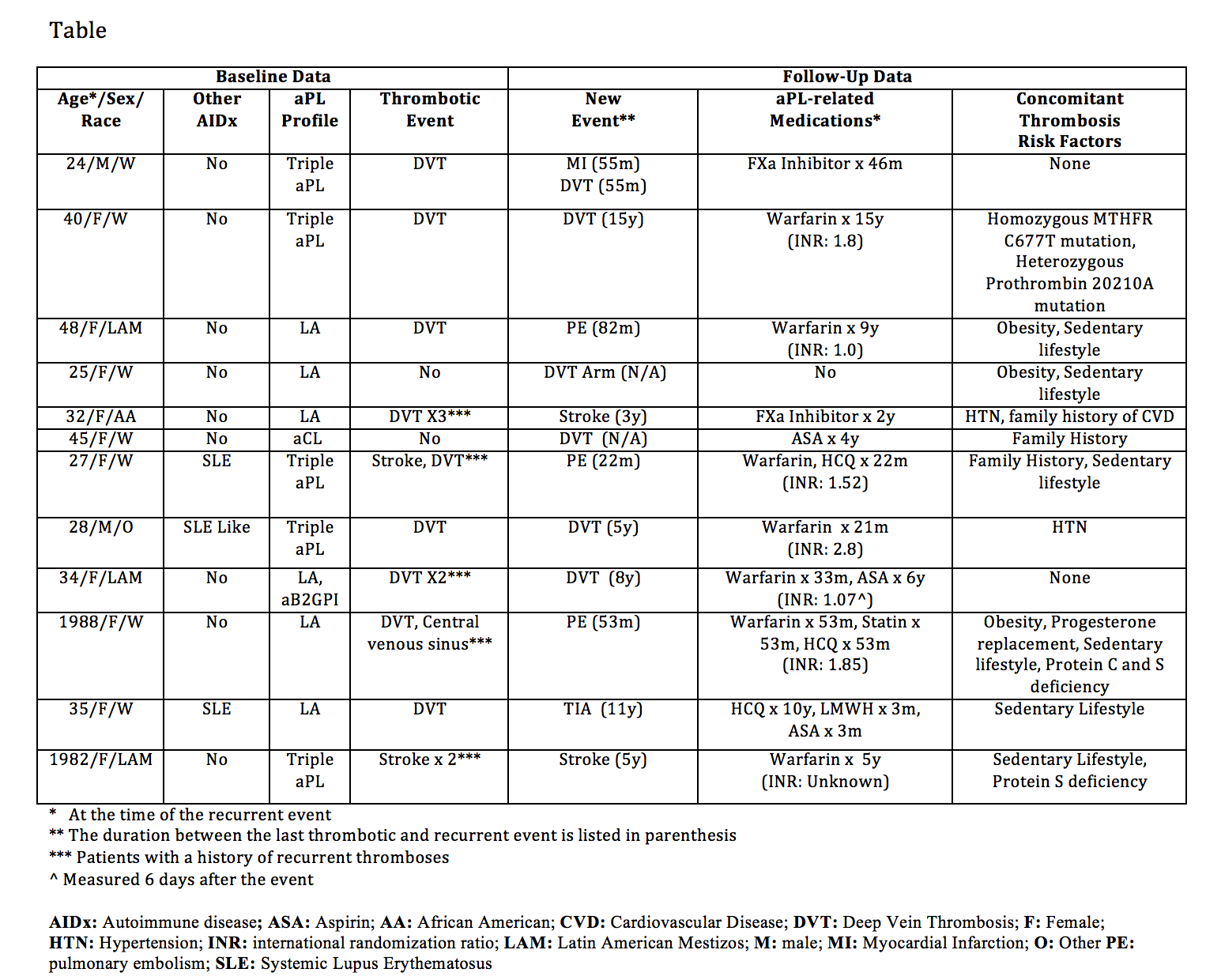Session Information
Date: Tuesday, November 7, 2017
Title: Antiphospholipid Syndrome
Session Type: ACR Concurrent Abstract Session
Session Time: 2:30PM-4:00PM
Background/Purpose: APS ACTION Registry was created to study the natural course of disease over 10 years in persistently antiphospholipid antibody (aPL)-positive patients with/without other systemic autoimmune diseases. Previously, based on 16 new thrombotic events, we reported the annual recurrent and first thrombosis risk in persistently aPL-positive patients as 2.38 and 1.86%, respectively (Arthritis Rheumatol. 2016; 68 [suppl 10]).)
Methods: A web-based data capture system is used to store patient demographics, history, and medications. Inclusion criteria are positive aPL based on the Updated Sapporo Classification Criteria at least twice within one year prior to enrollment. Patients are followed every 12±3 months with clinical data and blood collection; they also receive advice on cardiovascular disease and thrombosis prevention at each visit. In this descriptive analysis, we report additional thrombotic events based on patients who completed one-, two-, three-, and four-year follow-up visits.
Results: As of 4/2017, 671 patients were included (aPL/APS without any other autoimmune disease [AIDx]: 436 [no thrombosis: 88; thrombotic APS [TAPS]: 241; obstetric APS [OAPS]: 47; and TAPS+OAPS: 60]; and aPL/APS associated with another AIDx: 235 [no thrombosis: 67; TAPS: 118; OAPS: 18; and TAPS+OAPS: 32]). Of 671 patients, 515 (77%), 391 (58%), 243 (36%), and 52 (8%) completed their one-, two-, three-, and four-year follow-up visits, respectively. Mean follow up were 2.38 years (844 patient-years [pt-y]) and 2.23 years (357 pt-y) for those with and without a history of thrombosis, respectively. Table demonstrates the demographic, clinical, and laboratory characteristics of 13 patients who had new thrombosis since our most recent analysis. Based on a total of 22 recurrent events (10 events during the 1st year; 5 during the 2nd; 6 during the 3rd; and 1 during 4th) and six initial (3 events during the 1st year; 2 during the 2nd; and 1 during the 3rd) since the inception of the registry, the incident thrombosis risk was 2.60 and 1.68 per 100 pt-y in patients with and without history of thrombosis, respectively (annual thrombosis risk 2.63% and 1.68%, respectively). In a subgroup analysis, the incident thrombosis risk was: a) 3.13 and 1.50 per 100 pt-y in patients with and without history of thrombosis, respectively for those with other AIDx and b) 2.38 and 1.79 per 100 pt-y in patients with and without history of thrombosis, respectively for those without other AIDx.
Conclusion: The incident thrombosis risk remains relatively low and commonly associated with LA- and/or triple aPL-positivity as well as non-aPL thrombosis risk factors. The risk is similar between aPL- positive patients with and without other AIDx. Annual and risk stratified analysis of APS ACTION registry will better determine the risk of thrombosis in persistently aPL-positive patients based on different risk profiles.
To cite this abstract in AMA style:
Unlu O, Andrade D, Banzato A, Branch DW, Fortin PR, Gerosa M, Levy RA, Lopes M, Petri M, Rodriguez I, Tektonidou M, Ugarte A, Willis R, Erkan D, . OBOAA. Antiphospholipid Syndrome Alliance for Clinical Trials & International Networking (APS ACTION) Clinical Database and Repository (“Registry”) Analysis: First and Recurrent Thrombosis Risk after 1201 Patient-Years of Follow-up [abstract]. Arthritis Rheumatol. 2017; 69 (suppl 10). https://acrabstracts.org/abstract/antiphospholipid-syndrome-alliance-for-clinical-trials-international-networking-aps-action-clinical-database-and-repository-registry-analysis-first-and-recurrent-thrombosis-ri/. Accessed .« Back to 2017 ACR/ARHP Annual Meeting
ACR Meeting Abstracts - https://acrabstracts.org/abstract/antiphospholipid-syndrome-alliance-for-clinical-trials-international-networking-aps-action-clinical-database-and-repository-registry-analysis-first-and-recurrent-thrombosis-ri/

